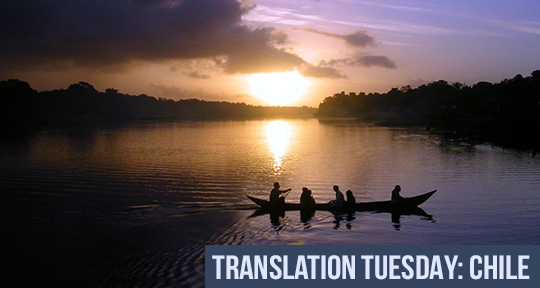Poet-translator Jonathan Cohen has recovered these stunning translations of Pablo Neruda’s poetry, made in 1950 by the extraordinary Waldeen. Who? Learn about her and the secret of her translations in Cohen’s essay, “Waldeen’s Neruda,” appearing on our blog tomorrow. Here, published for the first time in this week’s Translation Tuesday, is her rendering of the complete “Coming of the Rivers” sequence. Comprising five poems, the sequence comes from the opening section of Neruda’s epic Canto General titled “La lámpara en la tierra” (“Lamp in the Earth”) in which he celebrates the creation of South America.
Coming of the Rivers
Beloved of rivers, assailed by
blue water and transparent drops,
apparition like a tree of veins,
a dark goddess biting into apples:
then, when you awoke naked,
you were tattooed by rivers,
and on the wet summits your head
filled the world with new-found dew.
Water trembled about your waist.
You were fashioned out of streams
and lakes shimmered on your forehead.
From your dense mists, Mother, you
gathered water as if it were vital tears,
and dragged sources to the sands
across the planetary night,
traversing sharp massive rocks,
crushing in your pathway
all the salt of geology,
felling compact walls of forest,
splitting the muscles of quartz.
Orinoco
Orinoco, let me be on your shores
of that hour without hour;
let me go naked, as then,
enter your baptismal mists.
Orinoco of scarlet water,
let me dip my hands so they may return
to your maternity, to your course,
river of races, motherland of roots,
your wide murmur, your savage lamina
come from where I come, from the poor
and imperious solitudes, from a secret
like a blood steam, from a silent
clay mother.
Amazon
Amazon,
capital of water syllables,
patriarchal father, you are
the eternal secret
of fecundity,
rivers plunge into you like birds,
flame-colored pistils cover you,
great dead tree trunks people you with perfume,
the moon cannot hold vigil over you
nor measure you.
You are weighted with green sperm
like a nuptial tree, you are silvered
by the wild springtime,
you are reddened by timber,
blue in the moon of stones,
robed in ferrous vapor,
slow like the trail of a planet.
Tequendama
Tequendama, do you remember
your solitary passage along the heights
without witness, thread
of solitude, slender willfulness,
celestial line, platinum arrow,
do you remember step by step
opening walls of gold
until tumbling from the sky onto
the earthbound theater of vacant stone?
Bío Bío
But speak to me, Bío Bío,
those are your words gliding
through my mouth, you gave me
the language, the nocturnal song
mingled with rainfall and foliage.
You, before ever a child was seen,
told me the dawn of earth,
the powerful peace of your reign,
the axe buried with sheaf
of dead arrows, what leaves
of the cinnamon recounted to you
throughout a thousand years,
and then I saw you give yourself to the sea
divided into mouths and breasts,
wide and flowering, murmuring
a history the color of blood.
translated from the Spanish by Waldeen
Pablo Neruda, of Chile, is widely considered the most important Latin American poet of the twentieth century. He was awarded the Nobel Prize for Literature in 1971. His epic Canto General (“General Song”; 1950) is a Whitmanesque celebration of South America, in which the continuous struggle against oppression is central.
Waldeen (von Falkenstein) was an American-born dancer, choreographer, teacher, poet, and translator. Her 1950 translation of Pablo Neruda’s Let the Rail Splitter Awake and Other Poems (Masses & Mainstream) was widely distributed. For more about her, see Jonathan Cohen’s essay “Waldeen and the Americas.”
Jonathan Cohen is an award-winning translator of Latin American poetry and scholar of inter-American literature. He is the author of several studies of English translations of Pablo Neruda’s poetry. He became friends with Waldeen in the late 1980s. For more about him, see jonathancohenweb.com.
*****
Read more translations on the Asymptote blog:

